In 2025, AI in Developing the Future of Digital Marketing in 2025 will significantly shape digital marketing, transforming how businesses engage with consumers and optimize strategies. AI enables personalized, data-driven experiences, delivering tailored content and ads while using predictive analytics to anticipate consumer behavior. Automation will streamline tasks like content creation and customer service, allowing marketers to focus on strategy.
As AI evolves, it will deepen its role in marketing, improving targeting, content creation, and personalization. By 2025, advanced AI will offer deeper insights into audience preferences, optimizing ad performance and boosting ROI, unlocking new growth opportunities in digital marketing.
- AI is revolutionizing digital marketing by enabling personalized and data-driven marketing strategies.
- Predictive analytics will help marketers anticipate consumer behavior for more effective campaigns.
- Automation of tasks like content creation and customer service will increase efficiency and free up resources for strategic work.
- Advanced targeting powered by AI will improve ad performance and conversion rates in 2025.
- AI will become an essential tool for maintaining competitiveness in the evolving digital marketing landscape.
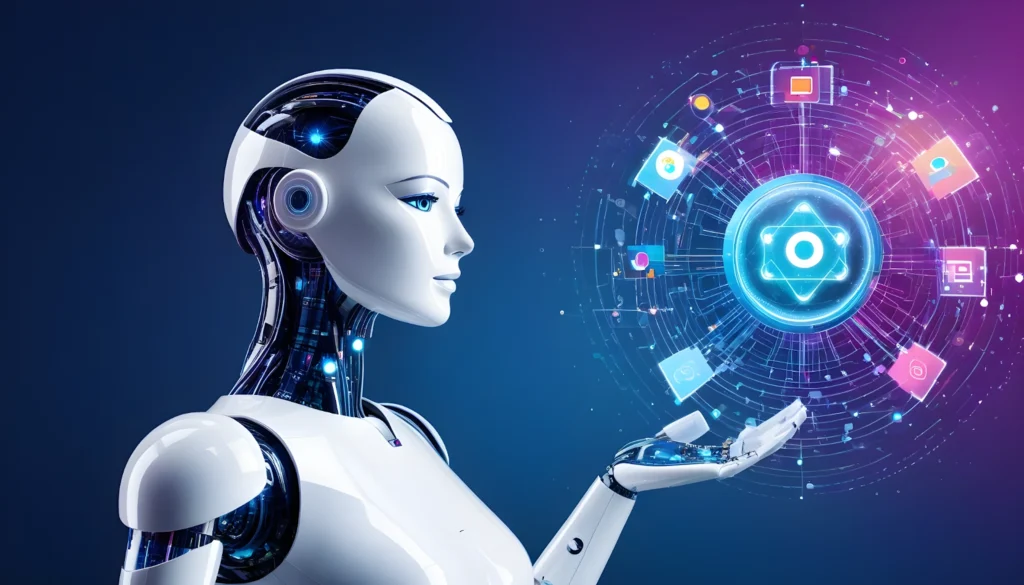
What is Artificial Intelligence?
Table of Contents
Artificial Intelligence (AI) enables machines to perform tasks that typically require human cognition, such as data analysis, language understanding, and decision-making. AI is transforming industries like healthcare, finance, marketing, and entertainment by automating processes and enhancing user experiences.
In digital marketing, AI in Developing the Future of Digital Marketing streamlines processes, boosts campaign efficiency, and delivers targeted results. AI tools automate tasks like customer segmentation and optimize campaigns by analyzing user behaviors and preferences. It personalizes content and improves engagement by tracking consumer activity.
As AI evolves, its influence on digital marketing will expand, becoming a key tool for businesses to stay competitive. AI is shaping the future of digital marketing by enhancing creativity, efficiency, and customer interaction.
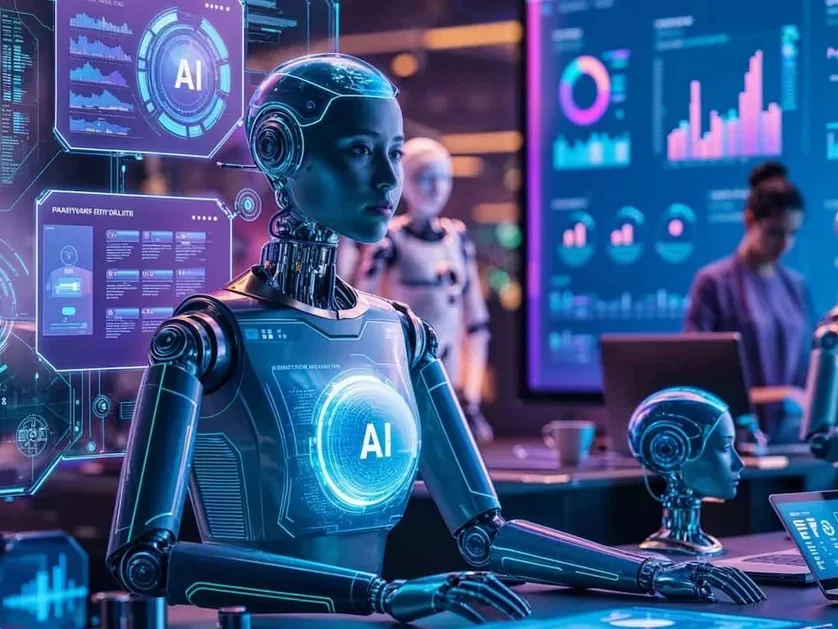
The Future of AI in Marketing: What’s Next After 2025?
As AI continues to transform digital marketing, its influence will strengthen by 2025. AI in Developing the Future of Digital Marketing will revolutionize brand-consumer engagement, data-driven decisions, and marketing optimization. AI-generated content, including text, images, and video, will improve in quality and consistency. To stay competitive, businesses must adapt and leverage AI’s potential in the rapidly evolving landscape.
The Growing Role of AI in Personalization
AI is playing an increasingly crucial role in personalizing customer experiences across digital platforms. By analyzing vast amounts of consumer data, AI helps marketers tailor content, offers, and interactions to individual preferences and behaviors. This leads to more engaging and relevant customer experiences, driving higher engagement, loyalty, and conversions.
- AI analyzes customer data to deliver personalized content, offers, and recommendations.
- It helps marketers predict consumer behavior and preferences with greater accuracy.
- Personalization powered by AI improves customer engagement and loyalty.
- AI enables real-time customization of digital experiences across websites, emails, and ads.
- The growing use of AI in personalization helps businesses stay competitive and relevant in the market.
Voice and Visual Search Powered by AI
AI is transforming how consumers search for information online, with voice and visual search becoming integral parts of the digital experience. Voice search, powered by AI, allows users to find products, services, and information simply by speaking. Similarly, visual search lets users search using images instead of text, enabling a more intuitive way to discover and purchase items.
- Voice Search: AI enables voice assistants like Siri, Alexa, and Google Assistant to understand and process spoken queries, making searches faster and more convenient.
- Visual Search: AI-powered image recognition allows users to search for products using pictures, improving product discovery.
- Improved User Experience: Both technologies create a more seamless, hands-free experience for consumers.
Predictive Analytics and Real-Time Decision-Making
Predictive analytics powered by AI is transforming how businesses anticipate consumer behavior and make data-driven decisions. By analyzing historical data and recognizing patterns, AI can predict future trends, allowing marketers to make proactive decisions and optimize campaigns. Real-time decision-making is enhanced by AI’s ability to process vast amounts of data instantly, enabling businesses to adjust their strategies quickly and efficiently for better results
- Predictive Analytics: AI analyzes past data to forecast future trends and behaviors, improving strategic planning
- Real-Time Adjustments: AI allows businesses to make immediate decisions based on real-time data, ensuring campaigns stay relevant
- Improved Efficiency: Predictive analytics helps prioritize resources and focus efforts on high-impact opportunities.
The Rise of AI-Enhanced Customer Service
AI in Developing the Future of Digital Marketing will transform customer service by 2025. Chatbots and virtual assistants will become more sophisticated, with a deeper understanding of human emotion and context, allowing for empathetic, dynamic interactions.
AI will proactively identify and address customer issues, offering solutions before customers ask. By analyzing data and behavior, AI will provide hyper-targeted, real-time support tailored to each customer’s needs.
The Ethical Considerations and Challenges of AI in Marketing
As AI continues to advance, ethical concerns about data privacy, transparency, and fairness will grow. By 2025, AI in Developing the Future of Digital Marketing will be deeply integrated into strategies, raising questions about how companies use consumer data.
Marketers must adopt responsible AI practices, ensuring transparency with customers and protecting privacy. AI should be inclusive and free from biases, providing equitable experiences for all consumers.
The future of AI in marketing will focus on using AI responsibly to build stronger, more transparent relationships with customers while maximizing AI’s capabilities.
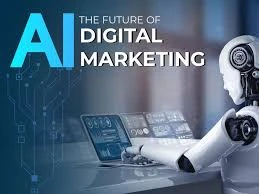
How AI is Transforming Digital Marketing
AI in Developing the Future of Digital Marketing is revolutionizing how businesses optimize strategies, enhance customer experiences, and automate processes. AI enables personalized content, predictive analytics, and better understanding of consumer behavior. It helps businesses streamline operations, improve engagement, and make data-driven decisions, driving higher ROI and maintaining competitiveness in a digital world.
- Personalization:AI tailors content, offers, and recommendations to individual customer preferences.
- Predictive Analytics: AI forecasts consumer behavior, allowing businesses to adjust campaigns and optimize marketing efforts.
- Automation: AI automates tasks like content creation, customer service, and social media management, freeing up time for strategic decisions.
- Enhanced Customer Experience: AI helps businesses deliver more relevant and engaging experiences across various touchpoints.
- Data-Driven Insights: AI analyzes vast amounts of data to provide actionable insights, enabling marketers to make more informed decisions.
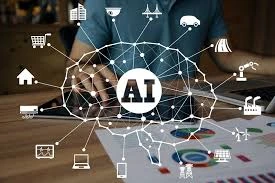
What AI Tools Will Shape Marketing?
AI in Developing the Future of Digital Marketing is transforming marketing with tools that optimize content, predict trends, and enhance customer engagement. These AI solutions are key to shaping the future of the industry.
As AI continues to evolve, a variety of powerful tools are emerging to transform the future of marketing. These AI tools help automate tasks, analyze consumer data, personalize experiences, and improve campaign performance. By leveraging AI, marketers can make more data-driven decisions, enhance customer engagement, and optimize their marketing strategies more efficiently.
- Chatbots and Virtual Assistants: Enhance customer service and engagement through AI-powered conversations that provide instant, personalized support.
- Predictive Analytics Tools: Use AI to analyze past behaviors and predict future trends, helping marketers create more targeted and timely campaigns.
- Content Generation Tools: Automate the creation of high-quality content, including blogs, social media posts, and even videos, using AI-driven algorithms.
- AI-Powered Ad Optimization: Tools like Google Ads and Facebook Ads use AI to optimize ad performance by automatically adjusting bids and targeting in real-time.
- Personalization Engines: AI tools that tailor website content, email campaigns, and product recommendations based on individual user data.
- Voice Search Optimization Tools: Help businesses optimize their content and digital presence for voice searches, improving visibility with AI-driven keyword analysis.
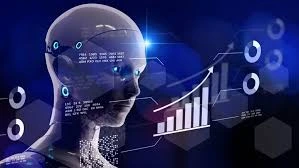
In 2025, AI will play an even more pivotal role in shaping the future of digital marketing, making it an essential tool for businesses aiming to stay ahead in an increasingly competitive landscape. AI in Developing the Future of Digital Marketing will enable advanced personalization, predictive analytics, and automation, helping brands create highly targeted, efficient campaigns that engage consumers on a deeper level.
The ability to analyze vast amounts of data and make real-time adjustments will enhance decision-making, improve customer experiences, and drive stronger ROI. As AI continues to evolve, its integration into digital marketing strategies will be key to achieving sustained growth, innovation, and relevance in a rapidly changing digital world. Businesses that embrace AI today will be well-positioned to lead the future of marketing in 2025 and beyond.
